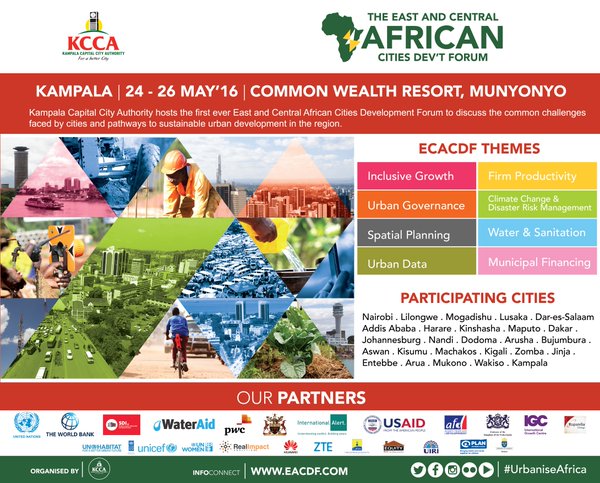In Kampala for ECAC-DeF on Building Inclusive Growth and Livability in African Cities, follow with #UrbaniseAfrica @KCCAUG @The_IGC
— Sarah Logan (@sarahalogan) May 22, 2016
Delegates arrive ahead of the E&C African Cities Dev’t Forum this Tuesday. #UrbaniseAfrica https://t.co/Vt7Zo7ByLh pic.twitter.com/S5ROApEvNh
— KCCA (@KCCAUG) May 22, 2016
Over 450 participants from 45 cities will be in Kampala this week as the Ugandan capital hosts the first East and Central African Cities Development Forum (CAC-DeF) May 24 to 26.
The forum was conceived to create a platform for urban managers, experts, development enthusiasts, development partners, and the private sector in the region to share knowledge and practical experiences and interventions that will foster sustainable urban development.

Thirteen key speakers including Dr. Jockins Arputham, the president of the National Slum Dwellers Federation of India, will address the forum as it discusses urbanization challenges in ECAC, growth of slums, increasing poverty and inequality, limited physical development planning, inefficient urban management, environmental degradation and low levels of municipal financing.
As the urban population continues to grow, the pressure mounted on the public service delivery systems increase tremendously straining the current infrastructural capacity and consequently compromising the quality of service delivery.
At the African Ministerial Conference on Housing and Urban Development (AMCHUD) in Nairobi in 2012, member countries committed to create National urban forums as a means of strengthening partnerships to respond to challenges of rapid urbanization. This was further emphasized with the recent, February 2016 Abuja declarations on sustainable urban development with a focus on regional urbanization agenda.

“With urbanization, we must be ready to tap its advantages but also be ready to respond to the vast challenges that come with it. We need to realize that Africa is urbanizing younger and at low levels of income than any other continent, this brings in the current challenges of high (youth) un-employment, high rates of slum growths, increased pressure on the existing infrastructure, climate change adaptation challenges among others,” said host, Jennifer Musisi, KCCA’s Executive Director.
“As KCCA, responding to the African Ministerial Conference and the 2016 Abuja declaration we realized there was a need for a regional forum to guide the course of Urbanization in the region.”
It is predicted that by 2030 East Africa will have 40% of people living in urban areas with Nairobi, Kampala, Dar el Salaam and Kigali having the highest growth rate.
“After the 2 days of deliberations, sharing experiences and best practices, the City Administrators will be expected to discuss and consent to the KAMPALA DECLARATION, which will guide them on the journey to re-shape the African Urban agenda.”
This first CAC-DeF will be hosted at Speke Hotel Munyonyo under the theme, “Building Inclusive Growth and Livability in African Cities”
To host the forum, Kampala Capital City Authority (KCCA) partnered with, The World Bank, IGC, PwC, Huawei, UN-Agencies, Slum Dwellers International, Real Impact Analytics, French Development Agency, Netherlands Government, Alliance France, Water Aid, USAID, International Alert, URA, Uganda Industrial Research Institute among others.
CAC-DeF 8 thematic areas:
1: Inclusive growth, Slum Upgrade and Engendering 2: Firm Productivity, Trade and Growth of the City Economy. 3: Urban Governance, Transformational Leadership and Citizen Accountability. 4: Climate Change, Urban Resilience and Disaster Risk Management. 5: Spatial Planning, Infrastructure, Mobility and Housing. 6: Water, Sanitation and Urban Health. 7: Urban Data, Research Capacity and Smart city. 8: Municipal Financing, PPPs and Alternative Financing
Key speakers:
Hastings Chikoko is the Regional Director for Africa at C40 Cities Climate Leadership Group, and in his role he supports cities in Africa in their climate action planning, measurement and implementation, helping them to forge inter-city as well as regional collaboration. He serves on the Advisory Board of African Centre for Cities.
Cesar Queiroz, former World Bank Highways Adviser, is now a consultant on roads and transport infrastructure with the WB and several agencies and countries. His main expertise is in public-private partnerships in infrastructure, road maintenance, financing, management and development, performance-based contracts, improving governance, quality assurance and evaluation, research, teaching and training.
 The Independent Uganda: You get the Truth we Pay the Price
The Independent Uganda: You get the Truth we Pay the Price



